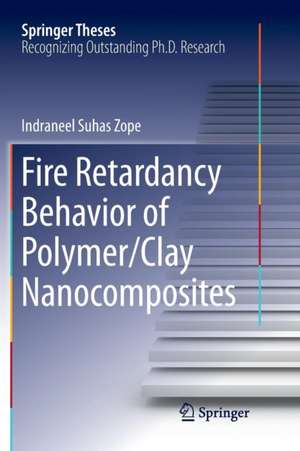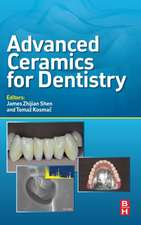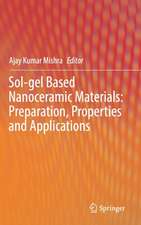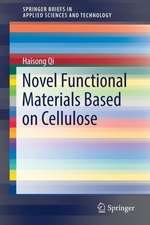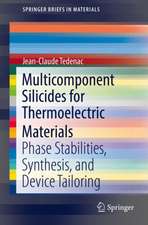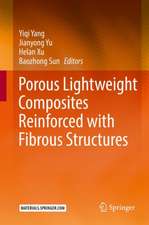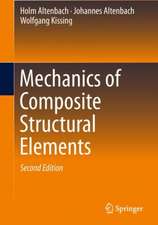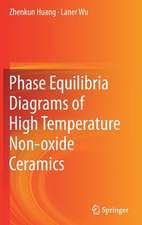Fire Retardancy Behavior of Polymer/Clay Nanocomposites: Springer Theses
Autor Indraneel Suhas Zopeen Limba Engleză Paperback – 25 dec 2018
| Toate formatele și edițiile | Preț | Express |
|---|---|---|
| Paperback (1) | 635.65 lei 6-8 săpt. | |
| Springer Nature Singapore – 25 dec 2018 | 635.65 lei 6-8 săpt. | |
| Hardback (1) | 641.85 lei 6-8 săpt. | |
| Springer Nature Singapore – 25 mai 2018 | 641.85 lei 6-8 săpt. |
Din seria Springer Theses
- 18%
 Preț: 997.88 lei
Preț: 997.88 lei -
 Preț: 389.88 lei
Preț: 389.88 lei - 15%
 Preț: 646.94 lei
Preț: 646.94 lei - 18%
 Preț: 943.43 lei
Preț: 943.43 lei -
 Preț: 399.29 lei
Preț: 399.29 lei - 18%
 Preț: 944.99 lei
Preț: 944.99 lei - 15%
 Preț: 636.80 lei
Preț: 636.80 lei - 18%
 Preț: 941.05 lei
Preț: 941.05 lei - 15%
 Preț: 643.16 lei
Preț: 643.16 lei - 15%
 Preț: 642.68 lei
Preț: 642.68 lei - 18%
 Preț: 1103.62 lei
Preț: 1103.62 lei - 20%
 Preț: 558.82 lei
Preț: 558.82 lei - 18%
 Preț: 1112.30 lei
Preț: 1112.30 lei - 18%
 Preț: 944.19 lei
Preț: 944.19 lei - 18%
 Preț: 1109.92 lei
Preț: 1109.92 lei - 18%
 Preț: 1217.27 lei
Preț: 1217.27 lei - 15%
 Preț: 640.06 lei
Preț: 640.06 lei - 15%
 Preț: 636.45 lei
Preț: 636.45 lei - 15%
 Preț: 640.06 lei
Preț: 640.06 lei - 15%
 Preț: 640.88 lei
Preț: 640.88 lei -
 Preț: 389.70 lei
Preț: 389.70 lei - 20%
 Preț: 563.89 lei
Preț: 563.89 lei -
 Preț: 393.35 lei
Preț: 393.35 lei - 15%
 Preț: 637.93 lei
Preț: 637.93 lei - 15%
 Preț: 641.85 lei
Preț: 641.85 lei - 18%
 Preț: 1225.94 lei
Preț: 1225.94 lei - 20%
 Preț: 551.36 lei
Preț: 551.36 lei - 18%
 Preț: 1229.10 lei
Preț: 1229.10 lei - 15%
 Preț: 639.25 lei
Preț: 639.25 lei - 18%
 Preț: 999.45 lei
Preț: 999.45 lei - 15%
 Preț: 640.06 lei
Preț: 640.06 lei - 18%
 Preț: 1220.45 lei
Preț: 1220.45 lei - 18%
 Preț: 1116.26 lei
Preț: 1116.26 lei - 18%
 Preț: 1110.72 lei
Preț: 1110.72 lei - 18%
 Preț: 1000.87 lei
Preț: 1000.87 lei - 18%
 Preț: 891.17 lei
Preț: 891.17 lei - 15%
 Preț: 640.06 lei
Preț: 640.06 lei - 5%
 Preț: 1154.07 lei
Preț: 1154.07 lei - 15%
 Preț: 635.96 lei
Preț: 635.96 lei - 15%
 Preț: 640.88 lei
Preț: 640.88 lei -
 Preț: 387.20 lei
Preț: 387.20 lei - 18%
 Preț: 1109.92 lei
Preț: 1109.92 lei -
 Preț: 385.25 lei
Preț: 385.25 lei -
 Preț: 385.25 lei
Preț: 385.25 lei - 18%
 Preț: 1112.30 lei
Preț: 1112.30 lei - 18%
 Preț: 999.45 lei
Preț: 999.45 lei -
 Preț: 386.99 lei
Preț: 386.99 lei - 15%
 Preț: 637.13 lei
Preț: 637.13 lei - 20%
 Preț: 554.20 lei
Preț: 554.20 lei - 20%
 Preț: 555.57 lei
Preț: 555.57 lei
Preț: 635.65 lei
Preț vechi: 747.82 lei
-15% Nou
Puncte Express: 953
Preț estimativ în valută:
121.63€ • 127.33$ • 100.64£
121.63€ • 127.33$ • 100.64£
Carte tipărită la comandă
Livrare economică 05-19 aprilie
Preluare comenzi: 021 569.72.76
Specificații
ISBN-13: 9789811341243
ISBN-10: 9811341249
Pagini: 200
Ilustrații: XXXII, 165 p. 95 illus., 78 illus. in color.
Dimensiuni: 155 x 235 x 11 mm
Greutate: 0.29 kg
Ediția:Softcover reprint of the original 1st ed. 2018
Editura: Springer Nature Singapore
Colecția Springer
Seria Springer Theses
Locul publicării:Singapore, Singapore
ISBN-10: 9811341249
Pagini: 200
Ilustrații: XXXII, 165 p. 95 illus., 78 illus. in color.
Dimensiuni: 155 x 235 x 11 mm
Greutate: 0.29 kg
Ediția:Softcover reprint of the original 1st ed. 2018
Editura: Springer Nature Singapore
Colecția Springer
Seria Springer Theses
Locul publicării:Singapore, Singapore
Cuprins
Introduction.- Literature Review.- Experimental Methodology.- Decomposition Behavior of Metal-ion Exchanged Clay.- Thermo-oxidative Decomposition Behavior of Polyamide 6 Nanocomposites with Metal-ion Exchanged Clays.- Thermo-oxidative Decomposition Behavior of Polyamide 6 Nanocomposites with Structurally Different Clays.- Controlling the Interfacial Interactions Between Clay and Host Polyamide 6 Matrix.- Clay Catalysis and Fire Retardancy of Polymer/Clay Nanocomposites: A Complete Overview.
Notă biografică
With a childhood dream of becoming an engineer by profession, Indraneel completed his Bachelor’s degree in Polymer Engineering from Maharashtra Institute of Technology, affiliated with University of Pune, India in 2003 and was a recipient of prestigious Shri Siddhivinayak Gold Medal for achieving first rank in Polymer Engineering. He later went on to attain his Master’s degree in Materials Science & Engineering from the Rochester Institute of Technology, USA in 2011. His PhD degree from School of Materials Science & Engineering, Nanyang Technological University, Singapore under the guidance of Asst. Professor Aravind Dasari earned him MSE Best PhD Thesis Award, Class of 2017. Upon completion of PhD, he continued to work as a post-doctoral fellow in Nanyang Technological University. His research interests include polymer structure-property relationship and product development. As of Dec 2017, he holds four Technology Disclosures and one Patent-pending invention. He has authored five first-author journal articles and one book chapter.
Textul de pe ultima copertă
This thesis investigates the early ignition behavior of polymer/clay nanocomposites, which are perceived as potential eco-friendly flame retardant systems. It examines the correlation between clay structural chemistry and high-temperature transformations with clay-assisted decomposition of organic macromolecules. In particular, it investigates the unique effects of metal ions like Mg2+, Al3+ and Fe3+ that are inherent in clays (smectite) on the combustion and thermo-oxidative decomposition of polyamide 6. The results indicate that metal ions present on/in montmorillonite platelets have preferential reactivity towards peroxy/alkoxy groups during polyamide 6 thermal decomposition. Lastly, a simple solution in the form of a physical coating on clay surface is proposed, based on the role of polymer–clay interfacial interaction.
Caracteristici
Provides a knowledge base on the catalytic nature of clay particles in relation to the early ignition behavior of polymer/clay nanocomposites Maximizes reader insights into the effects of individual metal ions inherent in clay on thermo-oxidation and combustion behaviors of polymer/clay nanocomposites Proposes solutions to overcome the ignition problem in nanocomposites without affecting other properties
